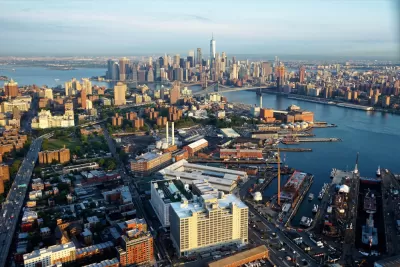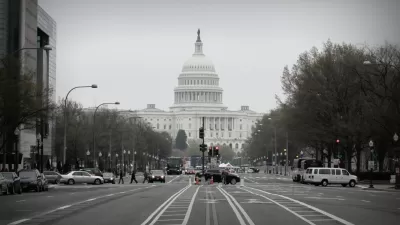A New York city councilmember, trained in urban planning, presents ideas for protecting tenants and small businesses in the ongoing economic downturn.

Brad Lander, member of the New York City Council representing parts of Brooklyn with a master's in urban planning, writes in The New York Times about the need to empower public and social interest in the real estate market in the wake of the coronavirus depression—preventing a 'feeding frenzy' by private developers.
So as the havoc of Covid-19 stirs the same dire warnings of New York’s demise as were heard during the 1970s fiscal crisis, history provides lessons in how not to respond. Fortunately it also provides a lesson for how we can rebound, using social ownership of land to help create a just, vibrant and durable recovery.
Citing the examples of Penn South in Chelsea and the Brooklyn Navy Yard, Lander also proposes legislation that outpace anything in D.C. or Albany that would support tenants and small businesses through the economic difficulties of the pandemic.
Instead of letting distressed properties be auctioned off when owners default on mortgages and taxes, the city should step in. We could acquire and hold these properties temporarily through a city-controlled land bank, based on legislation I’ve introduced, and then transfer them to a growing network of community land trusts, nonprofit entities that hold land in perpetuity for publicly beneficial uses.
The time to protect the interests of the public from the power of big money, according to Lander, is now—even if some of the long-term effects of the economic downturn aren't yet apparent.
FULL STORY: How to Avoid a Post-Recession Feeding Frenzy by Private Developers

Study: Maui’s Plan to Convert Vacation Rentals to Long-Term Housing Could Cause Nearly $1 Billion Economic Loss
The plan would reduce visitor accommodation by 25,% resulting in 1,900 jobs lost.

North Texas Transit Leaders Tout Benefits of TOD for Growing Region
At a summit focused on transit-oriented development, policymakers discussed how North Texas’ expanded light rail system can serve as a tool for economic growth.

Alabama: Trump Terminates Settlements for Black Communities Harmed By Raw Sewage
Trump deemed the landmark civil rights agreement “illegal DEI and environmental justice policy.”

How Community Science Connects People, Parks, and Biodiversity
Community science engages people of all backgrounds in documenting local biodiversity, strengthening connections to nature, and contributing to global efforts like the City Nature Challenge to build a more inclusive and resilient future.

Alabama: Trump Terminates Settlements for Black Communities Harmed By Raw Sewage
Trump deemed the landmark civil rights agreement “illegal DEI and environmental justice policy.”

Dear Tesla Driver: “It’s not You, It’s Him.”
Amidst a booming bumper sticker industry, one writer offers solace to those asking, “Does this car make me look fascist?”
Urban Design for Planners 1: Software Tools
This six-course series explores essential urban design concepts using open source software and equips planners with the tools they need to participate fully in the urban design process.
Planning for Universal Design
Learn the tools for implementing Universal Design in planning regulations.
City of Santa Clarita
Ascent Environmental
Institute for Housing and Urban Development Studies (IHS)
City of Grandview
Harvard GSD Executive Education
Toledo-Lucas County Plan Commissions
Salt Lake City
NYU Wagner Graduate School of Public Service





























